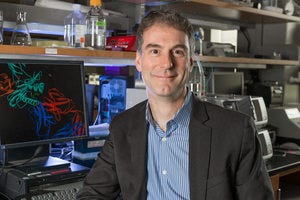Indiana Aims to Ignite Immunotherapy-based Cancer Cures
 Notre Dame researcher Dr. Brian Baker is using a $4 million grant to engineer new immune systems.
Notre Dame researcher Dr. Brian Baker is using a $4 million grant to engineer new immune systems.
Subscriber Benefit
As a subscriber you can listen to articles at work, in the car, or while you work out. Subscribe NowImmunotherapy is expected to be the key to uncovering cures for a variety of cancers, and Indiana is aiming to lead the charge. One of the largest gifts ever to the Indiana University School of Medicine (IUSM) is establishing the Brown Center for Immunotherapy, which will focus on what its leaders call revolutionary technology. Research lays the foundation for such leaps forward, and farther north in South Bend, a recent $4 million grant is adding fuel to a University of Notre Dame researcher’s fire to ignite the power of immunotherapy.
Immunotherapy centers on using a person’s own immune system to attack cancer, just as it would a bacteria or virus that enters the body.
“The principle of immunotherapy is to take a person’s immune cells and program them to attack a particular protein on a cancer cell. So wherever those cancer cells are, these immune cells will hunt them down and kill them,” says IUSM Executive Associate Dean for Research Affairs Dr. Anantha Shekhar. “We think it’s going to become part of most advanced cancer treatment centers, and we want to be in the forefront of that with the Brown Center for Immunotherapy.”
A $30 million gift from Indianapolis entrepreneur Dr. Donald Brown, an IUSM alumnus and founder of several successful software companies–including Interactive Intelligence–is establishing the center. Shekhar expects it to attract “cutting-edge scientists and innovators” to Indiana, creating one of the few centers in the country that will provide immunotherapy treatment.
Shekhar says immunotherapy has been “extraordinarily successful” in treating certain types of leukemia, and scientists expect the method to uncover cures for many other cancers. Initially, the Brown Center will focus on multiple myeloma and triple negative breast cancer.
“If we cure certain types of diseases or become the place for certain disease treatment, obviously, that enhances our reputation,” says Shekhar. “A previous example is testicular cancer; it was cured in Indiana, so even today, people from all over the world come here if they have testicular cancer. If we cure multiple myeloma or certain types of breast cancer, this will become the place to go for people who have those diseases.”
T cells are the immune system’s “little warriors” that lead the charge to kill cancer; these immune cells are the focus of a Notre Dame lab led by Dr. Brian Baker, the Rev. John A. Zahm professor and department chair of chemistry and biochemistry. The National Institutes of Health recently awarded Baker a five-year, $4 million grant to harness the power of T cells, which can be extracted from a patient and engineered in a lab to recognize tumor cells.
“It’s a T cell that does the killing. We’re trying to learn how to reprogram a patient’s T cells to target a particular cancer,” says Baker. “We want to precisely, personally develop immunotherapy for someone’s cancer by reprogramming their immune system.”
Immunotherapy cured former President Jimmy Carter’s melanoma; the skin cancer is the “rough focus” of Baker’s lab, but it’s striving to learn how to engineer T cell receptors generally. Baker expects that immunotherapy will be mainstream in 10 to 20 years.
“[This grant] is recognition that we’re doing really important, significant work that people think is worth the investment,” says Baker. “It’s a joint project that involves [collaborators at the medical schools at Loyola and Emory universities]; three people in three very different disciplines that are all coming together to try to crack this problem. Big problems like these require multiple people with multiple areas of expertise.”
While cancer has escaped the immune system, Baker aims to engineer new immune systems that take aim at the elusive disease. Taking such discoveries from scientists’ bench to patients’ bedside will be the focus of The Brown Center for Immunotherapy—making Indiana a leader in immunotherapy advancements, say researchers—and helping patients wage war against the disease.
Shekhar says immunotherapy could also uncover potential treatments for Alzheimer’s disease and other neurodegenerative disorders.
Baker says, although he gets much of the credit, graduate students in the lab are also “slogging away.”
While Baker’s lab isn’t focusing on a particular cancer, he says his early research could be most useful in treating melanoma.
